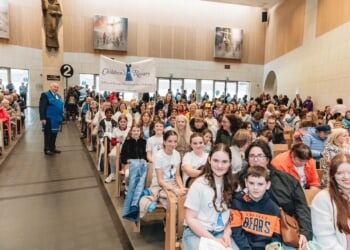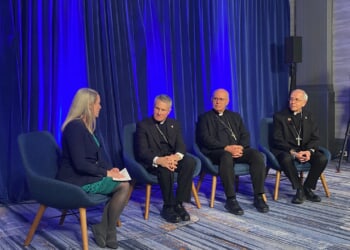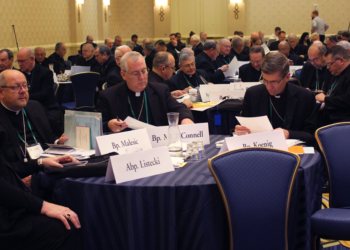For two centuries, Americans have dreamed of pushing our borders northward, from the War of 1812 to the globalist fantasies of the twentieth century. Each time, our national brothers and sisters in red have resisted. In short, Canada is not the United States of America. A campaign-season visit this April to the Canada Strong and Free Conference — the Far North’s equivalent of CPAC — led me to ponder the American Right’s renewal of the argument that Canada ought to be part of our country.
Stereotypes are generally acknowledged to carry kernels of fact. Most Americans observe that Canadians are less outgoing and less likely to ask strangers for directions. In this age, the observation of culture has become taboo, yet there was a time when culture was not merely whispered about in fear of enraging some mob lurking in the dark corners of BlueSky, but was subjected to genuine study and analysis. Understanding the meaning of culture may help Americans understand the unspoken divide between ourselves and Canada.
The Germans, most famously Georg Wilhelm Friedrich Hegel and his successors, popularized the international usage of the term geist and finally zeitgeist. The first: “ghost” or, more commonly in modern parlance, “spirit.” The second: “spirit of the age.” Less remembered is the equally important Volksgeist or Nationalgeist, the spirit of a people or nation. Although Hegel brought it to international renown, it was the historian Johann Gottfried Herder who developed this concept. Other Germans labeled it a Nationalcharakter, a term that needs no translation for the English speaker.
Subscribe to The American Spectator to receive our latest print magazine.
The Volksgeist and its study were thoroughly slain in the twentieth century. The term’s most notable offshoot, Völkerpsychologie, or folk psychology, sustained attacks both from the barbaric Nazis — who cared about race and blood, not culture — and the relativistic Left. Among relativists, the rejection of Völkerpsychologie can be viewed as part of the broader trend that Leo Strauss identified as the rise of the fact–value distinction. While relativist social scientists would posit facts, such as data about foods consumed or innovations made, they would never make cultural judgments or posit moral claims.
The study of a Volksgeist requires asking what vicious brutality drove the Indians to burn their widows until British courage stood between sobbing wives and funeral pyres or, more pertinently today, considering the ability of certain imported cultures to wage war upon Western values on Western soil.
What Is the American Zeitgeist?
The American spirit captures the Protestant work ethic in a sense. However, cultural surveys have found for decades with remarkable consistency that the United States scores closer to Catholic Europe and much of Latin America than to Protestant Europe in its cultural values and ability to adhere to tradition. Americans held onto higher birth rates and greater religiosity than the rest of the Protestant West, and we continue to cling to both as the scourges of modernity reach the traditional Catholic world.
Americans and Canadians would be best served by remembering the separate but complementary venerable legacies we honor.
The American spirit is difficult to pin down exactly, but we all recognize it in Ulysses S. Grant, Douglas MacArthur, and Betsy Ross. It includes individualism, saucy courage, and a willingness to tread where others have not dared, be that the beaches of Normandy or the face of the Moon.
We do not dub the plucky courage of Napoleon “the American spirit.” A brave spirit he may have had, but he was not American. That America venerates heroes who died with liberty and union on their lips, while Canada venerates heroes who died with a prayer for the soul of the queen, is relevant not just in the abstract, but in making Americans American and Canadians Canadian.
Rendering “geist” in English as “spirit” rather than “ghost” may have been a mistake. The souls of our nations are, in a sense, born of ghosts: the historical figures, events, and ideas we regard with awe to tell us who we are.
The Lost Canadian Zeitgeist
The renewed prominence of the idea of annexing Canada to the United States may be an outgrowth of the postnationalism fostered by wokeness. The Canadian Left has insisted to the world that the hundreds of thousands of Punjabis who have found their way into Canada by questionably legal means are as Canadian as moose and maple syrup, a phenomenon similar enough to recent American developments.
By Bill Wilson for The American Spectator
This is why the nationalism displayed recently by the Canadian Left comes off so bizarrely. They realize that Canada is different but seek to purge it of all the things that make Canada itself. They give no honor to the British character of the nation, for colonial history is shamed. They give no honor to Canada’s legacy of high churchmanship, for Christianity is purged from the public square. And they give no honor to the unique blend of Englishness and Frenchness that built Canada, for each newly imported group has to be seen as an entirely equal partner in a national project that they were not present for.
The history of Canada, which traces back to French colonists and their anti-revolutionary British North American neighbors, reflects a different set of historical ghosts than that of the United States. Those ghosts have produced a distinctly Canadian present. Monarchy and aristocracy are baked into Canada to a greater degree, a fact that inspires both Canadians’ famed politeness and the lack of emphasis on the boldness of the American spirit. To Americans, social mobility trumps all, while Canada has no equivalent of the American Dream.
Separate but Complementary Legacies
Both the United States and Canada are nations of the New World. This means that our nations transcend race. We are bound by our shared cultural memories. Others have always been welcome to adopt our forefathers as their own and, in Lincoln’s words, link themselves with an “electric cord,” thereby joining the body politic of the nation. Millions of Irish, Italians, Latinos, and others have become as thoroughly American as the black and white Anglo-Saxons who largely composed us at our founding. Thousands of Ukrainians and Indians (the present unchecked wave notwithstanding) have become as thoroughly Canadian as the French and British who formed Canada.
By joining the body politic, these immigrants abandoned loyalties elsewhere and adopted the doyens of their respective nations as their own forefathers. As we Americans struggle to recover deserved awe for our own history, we would do well to remember how it sets us apart from our beloved neighbors in Canada. Rather than deepening the disaster of national forgetfulness, both Americans and Canadians would be best served by remembering the separate but complementary venerable legacies we honor.
Subscribe to The American Spectator to receive our fall 2025 print magazine.












